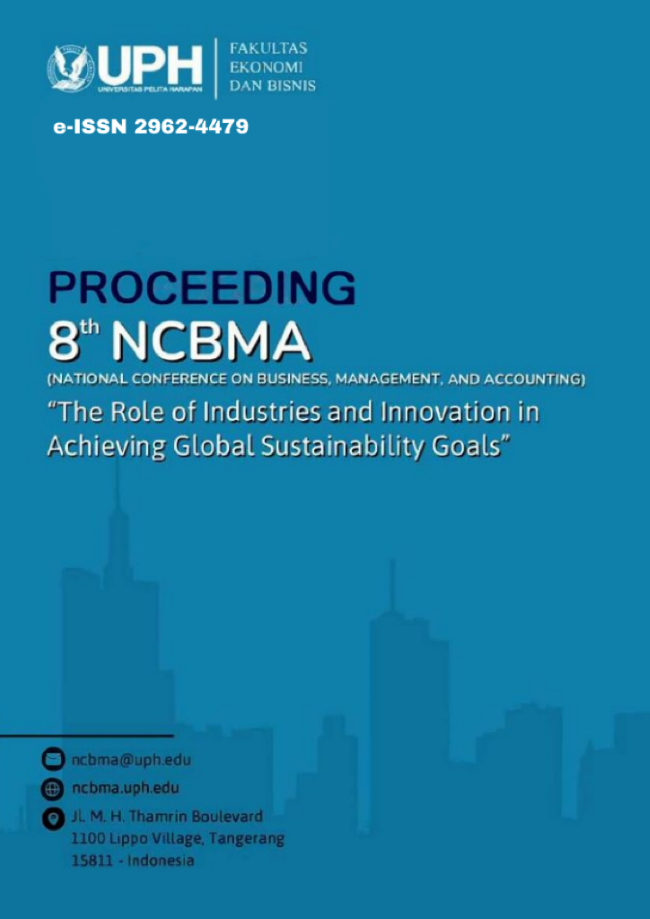ANALYZING EMPLOYEE ENGAGEMENT AMONG GENERATION Z: A LITERATURE REVIEW BASED ON JOB DEMANDS-RESOURCES MODEL, SOCIAL EXCHANGE THEORY, AND SELF-DETERMINATION THEORY
Keywords:
Employee Engagement, Generation Z, Job Demand-Resources Model, Social Exchange Theory, Self Determination TheoryAbstract
This paper presents a systematic literature review on the factors influencing employee engagement among Generation Z based on Job Demand-Resource Model, Social Exchange Theory, and Self Determination Theory. By examining empirical studies focusing exclusively on Generation Z employees, this review identifies key factors: psychological (job stress), leadership style, organizational factors (organizational support, organizational commitment, work meaningfulness, wellbeing, value fit), work life balance, and workplace flexibility. Findings from various studies are combined to formulate strategic recommendations for developing managerial policies and work environments adaptive to the unique characteristics of Generation Z in the lens of Job Demand-Resource Model, Social Exchange Theory, and Self Determination Theory. The results indicate that interventions targeting key factors identified in this review are critical to enhancing employee engagement among Generation Z
References
Bakker, A. B., & Demerouti, E. (2008). Towards a model of work engagement. Career Development International, 13(3), 209-223. https://doi.org/10.1108/13620430810870476
Bakker, A. B., & Albrecht, S. (2018). Work engagement: Current trends. Career Development International, 23(1), 4-11. https://doi.org/10.1108/CDI-11-2017-0207
Dimock, M. (2019). Defining generations: Where Millennials end and Generation Z begins. Pew Research Center. https://www.pewresearch.org/short-reads/2019/01/17/where-millennials-end-and-generation-z-begins/
Deloitte. (2022). The Deloitte Global 2022 Gen Z and Millennial Survey. Deloitte Insights. https://www.deloitte.com/global/en/issues/work/genzmillennialsurvey-2022.html
Dwidienawati, D., Ratnasari, E. D., Nugraha, I. O., Maharani, A., & Arsan, M. F. (2025). The influence of well-being, empowering leadership, and career development on work engagement in Generation Z in Indonesia. WSEAS Transactions on Business and Economics, 22, 1-16. http://dx.doi.org/10.37394/23207.2025.22.4
Goh, E., & Lee, C. (2018). A workforce to be reckoned with: The emerging pivotal Generation Z hospitality workforce. International Journal of Hospitality Management, 73, 20-28. http://dx.doi.org/10.1016/j.ijhm.2018.01.016
Harter, J. K., Schmidt, F. L., & Hayes, T. L. (2002). Business-unit-level relationship between employee satisfaction, employee engagement, and business outcomes: A meta-analysis. Journal of Applied Psychology, 87(2), 268-279. http://dx.doi.org/10.1037//0021-9010.87.2.268
Kahn, W. A. (1990). Psychological conditions of personal engagement and disengagement at work. Academy of Management Journal, 33(4), 692-724. https://doi.org/10.2307/256287
Kirchmayer, Z., & Fratričová, J. (2020). What motivates Generation Z at work? Insights into motivation drivers of business students in Slovakia. In Proceedings of the Innovation Management and Education Excellence through Vision 2020 (pp. 6019-6030). https://www.researchgate.net/publication/324797364_What_Motivates_Generation_Z_at_Work_Insights_into_Motivation_Drivers_of_Business_Students_in_Slovakia
Lanier, K. (2017). 5 things HR professionals need to know about Generation Z. Strategic HR Review, 16(6), 288-290. http://dx.doi.org/10.1108/SHR-08-2017-0051
Lee, S. H., Chong, C. W., & Ojo, A. O. (2024). Influence of workplace flexibility on employee engagement among young generation. Cogent Business & Management, 11(1), 2309705. http://dx.doi.org/10.1080/23311975.2024.2309705
Malidha, M., Ribhan, Yuningsih, & Mardiana, N. (2024). The effect of job stress on employee engagement with mindfulness as a moderation variable: Study of Gen Z employees in the coffee shop industry, Bandar Lampung. International Journal of Economics, Management and Accounting, 1(3), 304-315. http://dx.doi.org/10.61132/ijema.v1i3.180
Macey, W. H., & Schneider, B. (2008). The meaning of employee engagement. Industrial and Organizational Psychology, 1(1), 3-30. http://dx.doi.org/10.1111/j.1754-9434.2007.0002.x
Mazzetti, G., Robledo, E., Vignoli, M., Topa, G., Guglielmi, D., & Schaufeli, W. B. (2023). Work Engagement: A meta-Analysis Using the Job Demands-Resources Model. Psychological Reports, 126(3), 1069–1107. https://doi.org/10.1177/00332941211051988
Munajah, S., Elu, W. B., & Priyati, R. (2024). The mediation effect of individual value conformity with the organization in the influence of corporate image and organizational culture on employee engagement of Gen Z in Jakarta. Indonesian Journal of Business Analytics (IJBA), 4(5), 1983-1996. https://doi.org/10.55927/ijba.v4i5.11927
Ozkan, M., & Solmaz, B. (2015). The changing face of the employees—Generation Z and their perceptions of work. Procedia Economics and Finance, 26, 476-483. http://dx.doi.org/10.1016/S2212-5671(15)00876-X
Rachmadini, F., & Riyanto, S. (2020). The impact of work-life balance on employee engagement in Generation Z. IOSR Journal of Humanities and Social Science (IOSR-JHSS), 25(5), 62-66. https://www.researchgate.net/publication/343391235_The_Impact_of_Work-Life_Balance_onEmployee_Engagement_in_Generation_Z
Ryan, R. M., & Deci, E. L. (2000). Self-determination theory and the facilitation of intrinsic motivation, social development, and well-being. American Psychologist, 55(1), 68-78. https://psycnet.apa.org/doi/10.1037/0003-066X.55.1.68
Schroth, H. (2019). Are you ready for Gen Z in the workplace? California Management Review, 61(3), 5-18. https://www.researchgate.net/publication/332302692_Are_You_Ready_for_Gen_Z_in_the_Workplace
Saks, A. M. (2006). Antecedents and consequences of employee engagement. Journal of Managerial Psychology, 21(7), 600-619. https://www.researchgate.net/publication/275714108_Antecedents_and_Consequences_of_Employee_Engagement
Schaufeli, W. B., Salanova, M., González-Romá, V., & Bakker, A. B. (2002). The measurement of engagement and burnout: A two sample confirmatory factor analytic approach. Journal of Happiness Studies, 3(1), 71-92. https://psycnet.apa.org/doi/10.1023/A:1015630930326
Turner, A. (2015). Generation Z: Technology and social interest. Journal of Individual Psychology, 71(2), 103-113. https://psycnet.apa.org/doi/10.1353/jip.2015.0021
Twenge, J. M., Campbell, S. M., Hoffman, B. J., & Lance, C. E. (2010). Generational differences in work values: Leisure and extrinsic values increasing, social and intrinsic values decreasing. Journal of Management, 36(5), 1117-1142. https://psycnet.apa.org/doi/10.1177/0149206309352246
Widodo, T., Wening, N., Nakuloadi, H., Rustiana, E., & Saifuddiin, M. R. (2025). Work engagement in generation Z employees: Organizational commitment, perceived organizational support and work meaningfulness. SDGsReview, 5, e02610, 01-26. http://dx.doi.org/10.47172/2965-730X.SDGsReview.v5.n02.pe02610
Wiedemann, C. S. (2016). Investigating employee engagement through a self-determination theory framework. Clemson University. Retrieved from https://tigerprints.clemson.edu/all_theses/2549
Xiao, Y., & Watson, M. (2019). Guidance on conducting a systematic literature review. Journal of Planning Education and Research, 39(1), 93–112. https://doi.org/10.1177/0739456X17723971
Yin, N. (2019). Interpretation of employee job engagement based on social exchange theory. Business School, Nanjing Xiaozhuang University. https://www.clausiuspress.com/conferences/LNEMSS/ICPEM%202019/ICPEM051.pdf
Downloads
Published
Issue
Section
License

This work is licensed under a Creative Commons Attribution-ShareAlike 4.0 International License.

